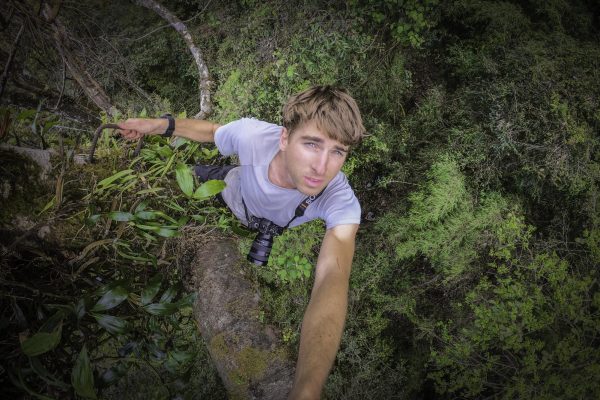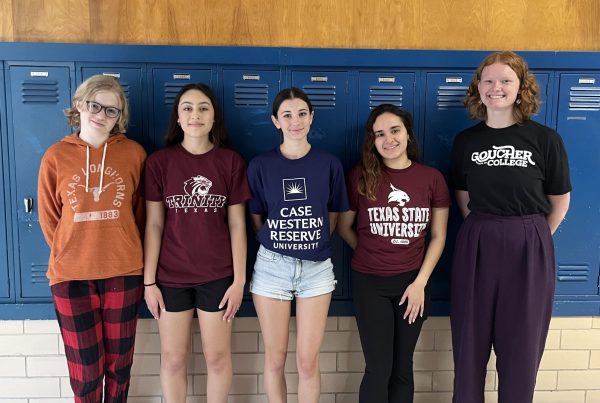Eric Wydeven: climber, craftsman, Carver fan
Free-thinking English teacher has skeletons in his closet … literally
Equipped with his backpack and helmet, Eric Wydeven enjoys a climbing trip in Mexico.
The Proust Questionnaire, named after French writer Marcel Proust, is a series of 35 questions designed to gauge the personality and values of the answerer. In the Shield’s latest edition of the questionnaire, Samantha Powers and Grace Nugent shot the breeze with English teacher Eric Wydeven.
The Shield: What is your idea of perfect happiness?
Eric Wydeven: Oh, that’d be a rock climb. Perfect happiness exists on the top of the fourth pitch of a formation called Gertch in the Oregon mountains. It’s thousands of feet above the ground, and there’s nobody to bother you, and I never bring papers to grade.
TS: What’s a pitch?
Wydeven: A pitch is a rope length of climbing. So you do four rope lengths, so roughly 800 feet off the start of the route, but on this particular climb, you hike-hike-hike up a hill for a couple of miles, so, when you’re 800 feet off the actual ground, it looks like you’re thousands of feet in the sky. That’s the place to be. It is my happy place. Whenever I’m thinking horrible, bad thoughts, I take myself to the top of the fourth pitch of Gertch, and I think about the serenity as I wait for my partner to arrive.
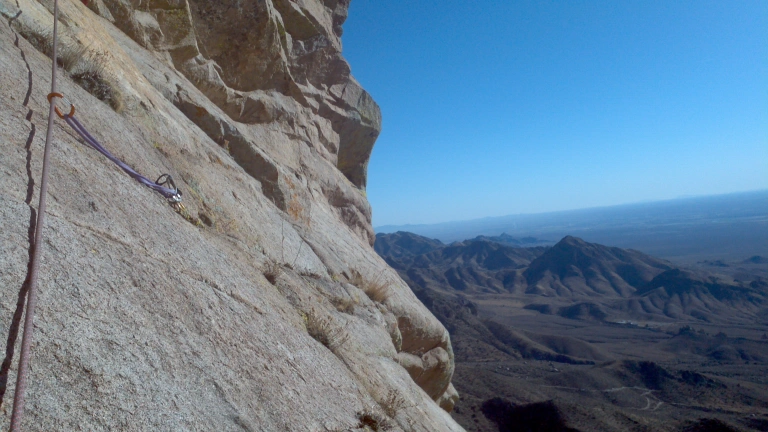
TS: What is the trait you most deplore in others?
Wydeven: Laziness. Apathy and laziness… Or people that are just so full of talk. A lack of engagement—in whatever you’re doing. I don’t care if you’re rock-climbing, or studying Proust, or painting a car, do it as well as you can, and therefore grow from that experience.
TS: Which living person do you most admire?
Wydeven: “Admire” is a strange word. I don’t know, who do I most admire? Like, there’s some people I would most like to meet, like, I’d love to have dinner with Tom Waits. I’m not sure that I admire him as much as I find him an intriguing character. Who do I most admire? I think I have some admiration for my wife in that she exhibits a bunch of character traits and qualities that I just don’t, and I wish, in some capacity, I could be more like her. She’s so smart, and she’s so with it, and her mind is very, very quick. And I admire those qualities in her, and I am just not that. I’m not that quick in wit. I think I can come around to intelligence, but it takes me a great deal of time to process things and to come to terms with what I believe and what I truly think. So, I don’t know, Anna Wydeven. Isn’t that sweet? I wanna get her a copy of this.
TS: What is your greatest extravagance?
Wydeven: Stupid little skeletons. I collect skulls, and it started out with kind of authentic, real skulls that I would find in the woods, or other people would find them in the woods and give ’em to me: “Hey, I found this skull!” But now, it’s ceramic skulls, and skulls carved of bone, and skulls that are carved out of rock. And I’ve got a lot of them. My wife is like, “Do you really need more skulls?” And, of course, the answer is yes. My greatest extravagance—that’s probably it. I spend a lot of money on food, so if it’s economic extravagance, I probably spend more money on dining than any other—my mortgage probably outgoes that—but we spend a lot of money at restaurants. It’s a fair extravagance for us.
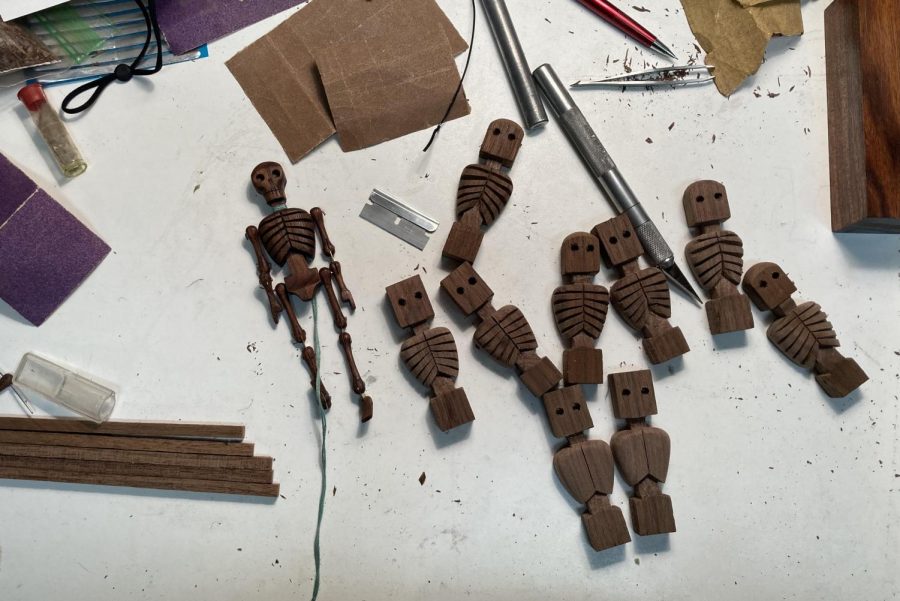
TS: What is your current state of mind?
Wydeven: Disturbed. Well, shoot, my current state of mind—I find myself a little on edge, I think because of those aforementioned questions. I’m feeling like I’m not doing a very good job in the classroom, I’m feeling like some of my students are a little apathetic towards the work, and are not—I feel like I want more for them out of the class than they want for themselves, and so my mind is full scorpions much of the time, and I guess if that’s a state of mind…
TS: What do you consider the most overrated virtue?
Wydeven: Like, in a Benjamin Franklin kind of way, huh? Beauty. Is beauty a virtue? Beauty’s not a virtue. I guess physical beauty. I think we spend so much time in our society trying to be beautiful, often at the expense of being internally beautiful. And so much money’s gone into the beauty and fashion industry, and I’ve seen “The Devil Wears Prada,” I get it, I know. But, I don’t know, I guess beauty. I’m not sure if that’s a virtue, though.
TS: On what occasion do you lie?
Wydeven: Oh, I’ve lied all through this interview. Well, okay, so honestly, I’m a smoker. And I had successfully quit for about a year, but then I slipped back in right at the beginning of this school year, oddly enough, I kind of slipped back onto tobacco and cigarettes, and hid that fact from my wife and family for many months. And in fact, even once when my wife said, “Are you smoking?” I flat-out lied. And I made good on that, I came back and said, “Okay, I have something to confess.” …She reacted much better than I thought. She reacted out of concern, and support, and I thought she was going to scream at me, and be super angry, which I think she was, but she swallowed that to adopt a support role. Good for her. Another admirable characteristic.
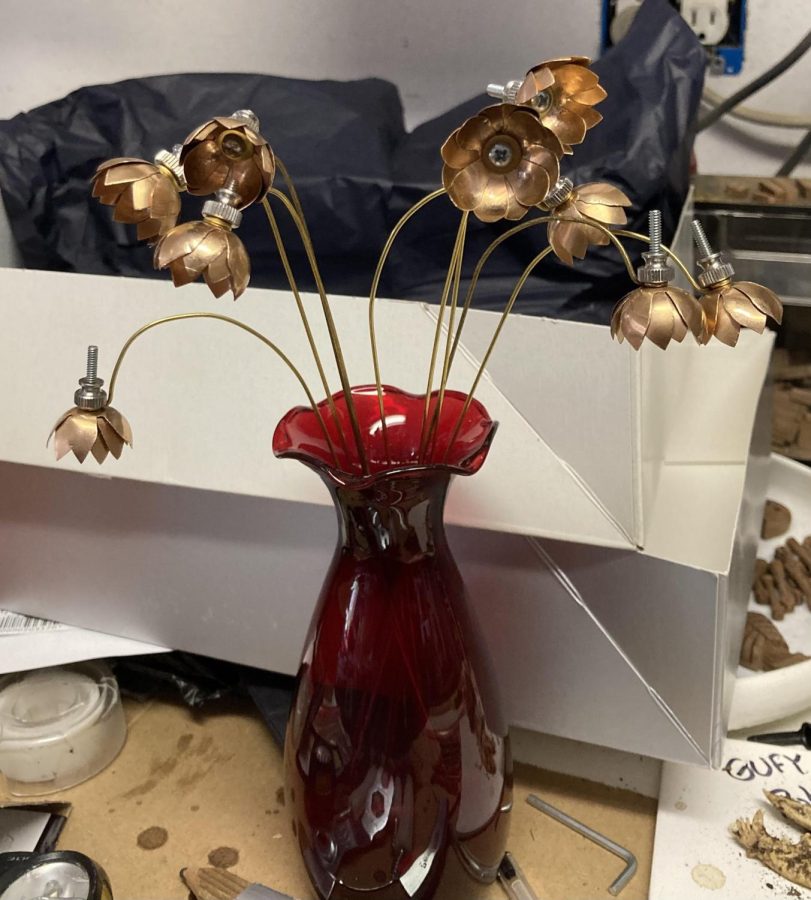
TS: What or who is the greatest love of your life?
Wydeven: Oh, that would be Anna Wydeven. Or Molly Bozak. No, Molly, I dated in junior high school and then high school, like on and off for several years, and I still wonder, “What’s going on with Molly? Where’s Molly Bozak today?” Maybe she’ll read this article, and she’ll reach out. But no, Anna Wydeven. Sometimes, it’s been a struggle, but I think anytime you get into human relationships, people will struggle.
TS: Can I ask how it ended with Molly?
Wydeven: Well, man, Chris got Molly. Yeah, Chris was a jerk. He was not nice to people. He was a bully, I suspect he wasn’t even nice to Molly, but for some reason, Chris got Molly and I did not. God, my wife’s not gonna read this article.
TS: If you could change one thing about yourself, what would it be?
Wydeven: I’d be more patient. I think—patience. Flat-out. I’m impatient with my kids, I’m sometimes intolerant with my students. Most of the time, I can control it in the classroom, but I tend to be really impatient with my own kids, and more critical than praiseworthy. So, I guess where patience and the ability to provide constructive praise—where that overlaps, I could use some of that.
TS: What do you consider your greatest achievement?
Wydeven: Well, gee whiz. Well, it sounds silly in the realm of so many things, like, got two wonderful kids. I think it’s the ability to construct things with my hands. To manufacture things from other things, to alter metals and woods until they represent another form. Craft. I’m a craftsman.
TS: Do you have a favorite thing that you’ve made?
Wydeven: I do, yeah. I make these little skeletons out of wood. I’m really proud of those. They take a really long time, and they’re always gifts. I mean, I have a couple for myself, but they’re always gifts, and kind of tokens of my appreciation and love for my friends and family, because they take forever. And I make little flowers for my wife, too, for birthdays and Christmas. I make metal flowers that are kinda cool.
TS: What is your most treasured possession?
Wydeven: Oh, my kids, for sure. Well, no, they’re not possessions, darn it. My most treasured possession—I guess it would have to be the guitar I play every day. Not my nice 2002 Gibson Les Paul Classic, because I rarely play that. But the cheap-ass acoustic guitar that was given to me by a friend of my kids’ dad who just never played it, and he knew I did, and he said, “Maybe you would like this,” that’s probably—it’s the possession I use the most. And, because it provides me with some kind of meditative breaks from reality, it’s a pretty important thing.
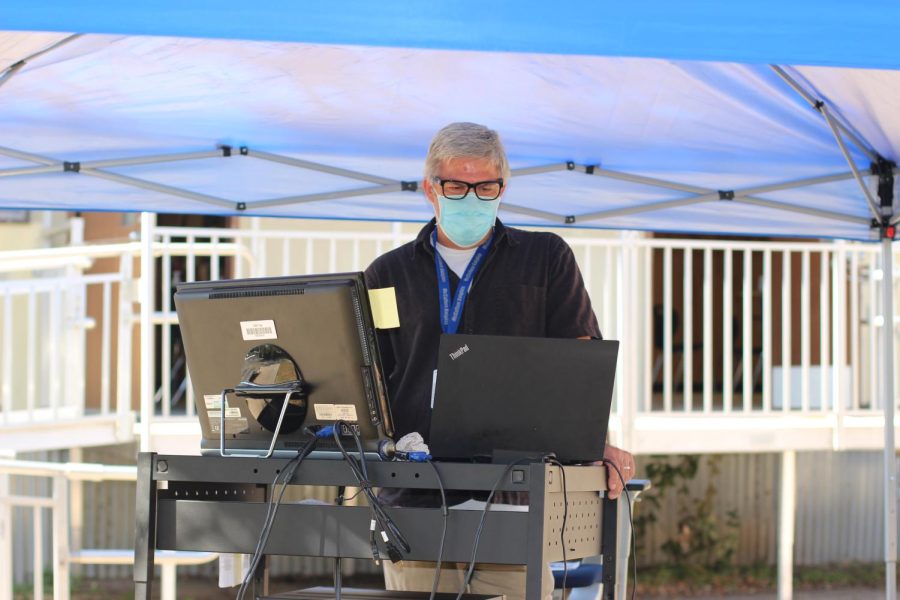
TS: What is your favorite occupation?
Wydeven: Teaching. Teaching rocks, man. I mean, it’s really—teaching sucks, because it’s emotionally taxing, and requires great managerial skills, and patience, and the ability to see the good in other people. I don’t know, it’s just rewarding. It is so humanity-based that, every day, I’m exposed to groups of 30 people who come together and form a chemistry and a community, and the morphing and changing of that—it’s been, over the years, a really cool study in humanity and it’s taught me a lot about being human. There’s no better job than teaching high school. It’s a good gig.
[Teaching has] been, over the years, a really cool study in humanity and it’s taught me a lot about being human. There’s no better job than teaching high school.
— Eric Wydeven
TS: What is your most marked characteristic?
Wydeven: Oh, my sass. My sarcasm. I’m sarcastic, and I think if you ask anybody, that would be one of the first things they say, is, “That guy’s a wise-ass.” But I don’t think in a derogatory way, just sassy.
TS: What do you most value in your friends?
Wydeven: I guess kindness. That’s probably it. My first was like, “Oh, good belayer,” but that’s one thing. There are many good belayers, but the ones who are kind are better belayers than the ones who are not kind. Also, I’m lucky enough to climb with a few people who are philosophers. Not by degree, but just by the ways they approach the world and think about things. They’re first kind, but they’re kind because they’re informed in a philosophical kind of way. I just have lots of interesting questions. We have such brilliant discussions. For me, climbing is like part therapy, part church, part exercise, part, you know, yoga. And because of this crew. They’re just good, kind people with stuff to talk about. I’m super lucky, I know.
TS: Who are your favorite writers?
Wydeven: Raymond Carver. He’s a minimalist short story writer. I like a guy named James Salter, who wrote kind of an existential text about a mountain climber. Who am I a sucker for? I’m a sucker for Cormac McCarthy. He is the darkest, darkest human being ever. In fact, I would like to meet him. I’d like to have dinner with Tom Waits and Cormac McCarthy.
TS: What is your greatest regret?
Wydeven: This is going to sound like a bunch of hooey, but I regret not being a better high school student. I feel like I was the kind of student that did what it took to progress to the next grade. I only missed enough days that they wouldn’t tick me on absences, I did enough of my work to get a 70 and not a grade higher than that, until I was a senior. When I was a senior, I was like, “You know what, I’m gonna try really hard,” and I ended up getting good grades. But I think the gist is, in terms of high school being kind of a foundational period, the more I learned and engaged in information and knowledge about the world, at that point, it would have just changed my trajectory. Everything would be different. And again, I’m pretty happy where I am, but I regret that. I would like to treat high school differently. Dude, I crushed college. I got to college, and I was like, “Whoa, this is great.” I mean, I got good grades, passed my classes, was engaged, and just learned so much.
TS: Probably because you’re more of a free thinker. More room for those in college.
For me, climbing is like part therapy, part church, part exercise, part, you know, yoga.
— Eric Wydeven
Wydeven: Maybe so. Maybe that’s it. But I think I could have been that in high school, I mean, I see some of my students who are that in high school, and it’s okay, you can still do it. I just didn’t know how, and didn’t really understand that there was anything more…I don’t know, I didn’t get it. I think I get it differently now. As we always do. Youth is wasted on the young.
TS: How would you like to die?
Wydeven: Well, I’d like to get lung cancer. No. How would I like to die? Quickly and peacefully. I guess maybe I’d like to freeze to death. That seems like maybe it would be an okay way. That would be quick. I think it would be more akin to just kind of drifting off. Yeah, I would not like to die a violent death. I definitely don’t want to get cancer, and maybe that’s my greatest fear. Having been a smoker for so long, that’s something I think a lot about. So how would I like to die? I’d love to say I’d like to fall off a mountain, but I don’t really wanna do that. If that were the case, I think I’d wanna enjoy the fall. I’d wanna be there to experience whatever there is to experience.
TS: What is your motto?
Wydeven: Well, the Jack Handey stuff comes to mind. “I’m good enough, I’m smart enough, and gosh-darnit, people like me.” But I don’t know if that’s it. I don’t really have a motto.
TS: There’s a motto hanging on your door that students see on the way out.
Wydeven: “Do not go gently into that good night.” Well, I do that on the way out the door. I don’t really have anything I say. The ritual is merely acknowledgement that I am leaving this place in order to go engage in the day and to do it as well as I can. It’s a conscious thing. I look at the same spot above the door frame, where I imagine that there’s a picture there, and it’s really a picture of Popeye—I don’t know why. There is no picture of Popeye there, but I imagine a picture of Popeye there, and I think it’s because, maybe this is it: “I am what I am.” And that’s a Popeye phrase that suggests, “Hey, I’m gonna bring me to the table, and it’s just gonna have to be good enough.”



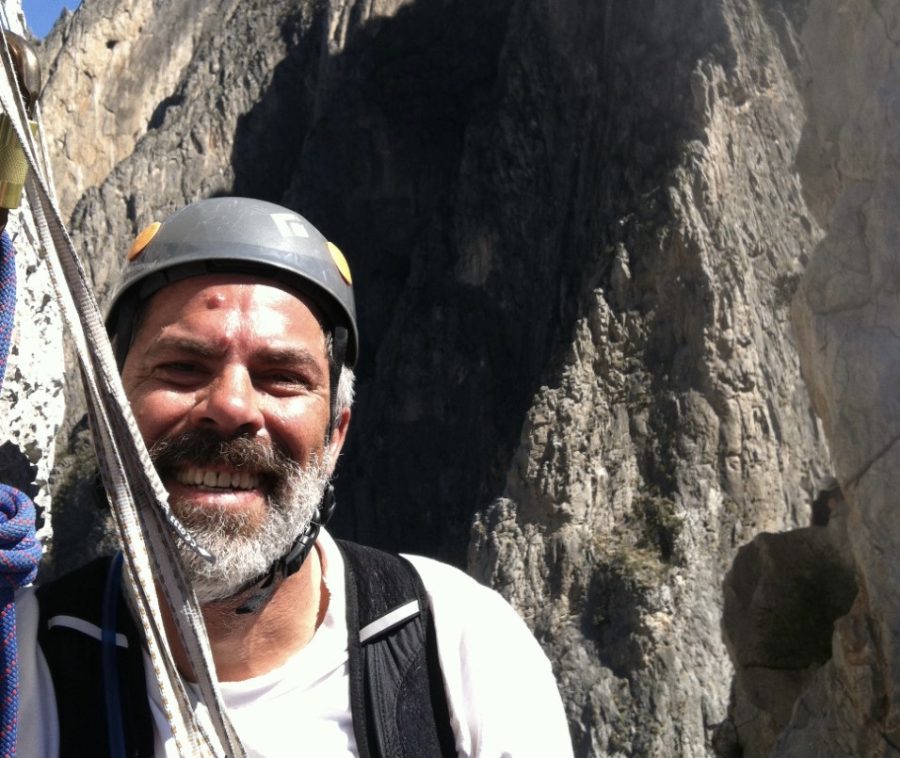
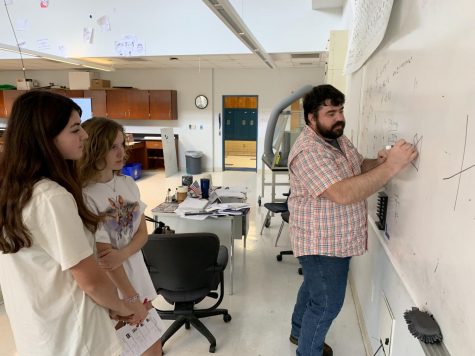
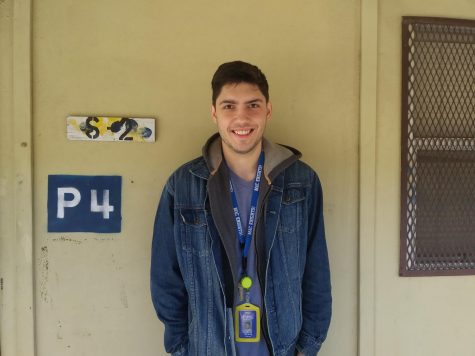
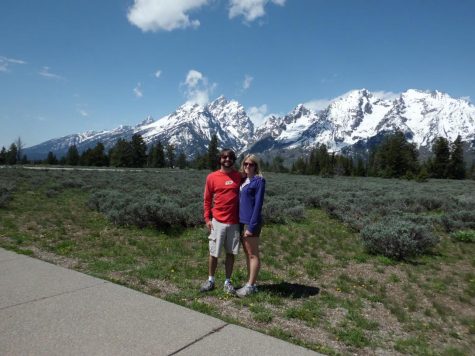
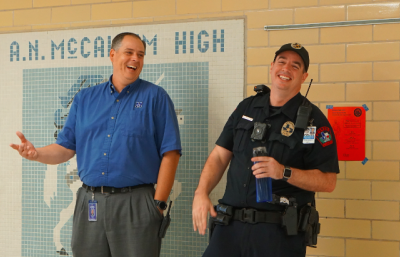
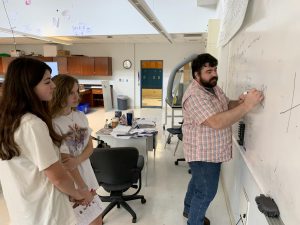


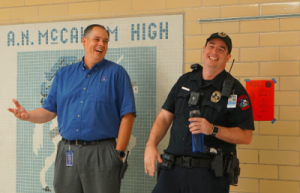
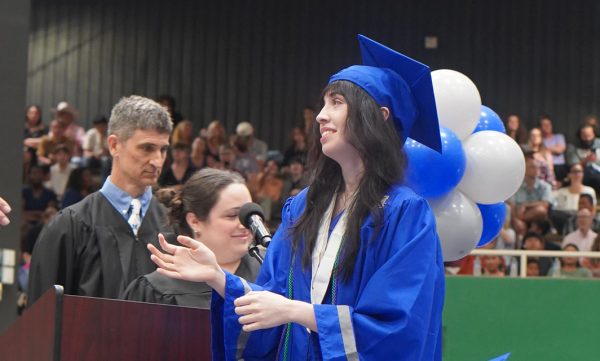

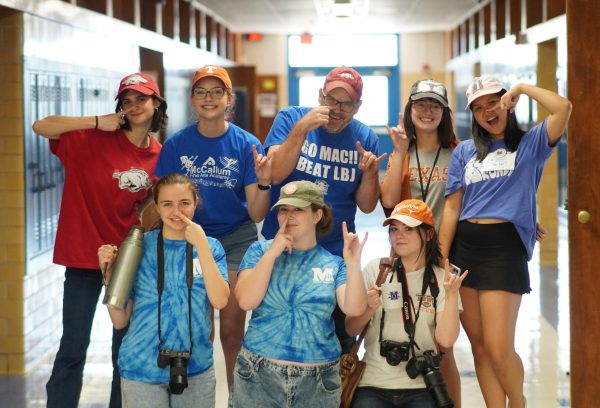
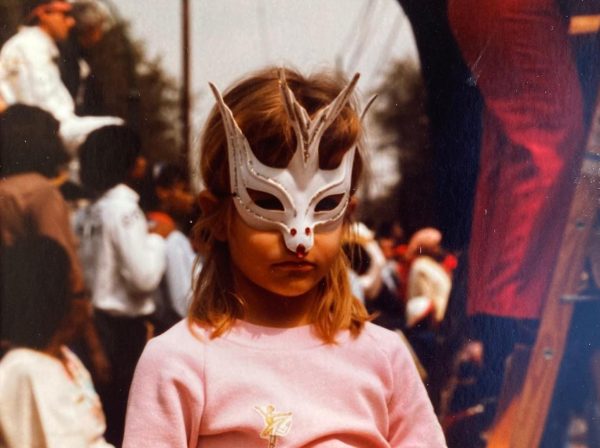
![This is Paul Pews high school graduation photo. The 2023-2024 school year marked his 34th year of teaching. He began his career in Washington, then came to McCallum where he has taught for the past 17. At heart though, he’s really a musician. One that grew up in many different places, including Chicago and California, who took interest in teaching from a young age. His high school choir experience, along with some international singing in college, persuaded him that teaching was his path. He knew he wanted to be able to help create works of art in the fine arts department as well, so he joined McCallum. He’s worked on many of the musicals over the years, even before Joshua Denning, the former theatre director of the fine arts program arrived. Before him was a different director: Tatum.
“I was the music director for all the musicals,” Pew said. “[Mr. Tatum and I] worked very hard, and I just got to the point where I was satisfied with it.” Although he may not be as prominent of a member in the musical theatre community at McCallum anymore, he still plays piano. “I still do a lot of music down at the Music end of the building,” Pew said. Photo courtesy of Paul Pew.](https://macshieldonline.com/wp-content/uploads/2024/07/Paul-Pew-1974-444x600.jpg)
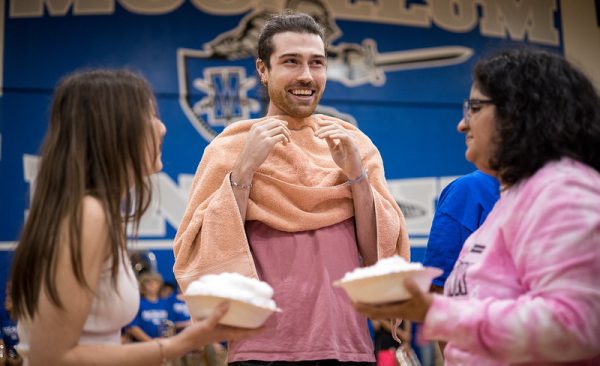
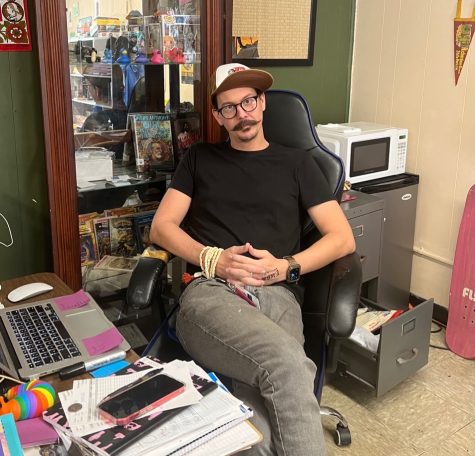
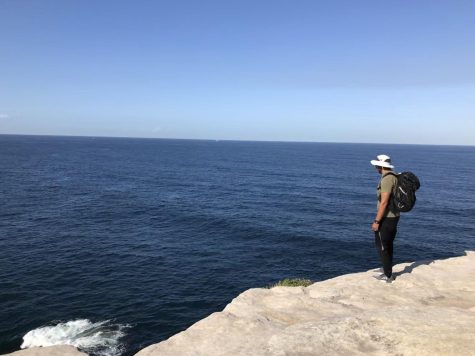
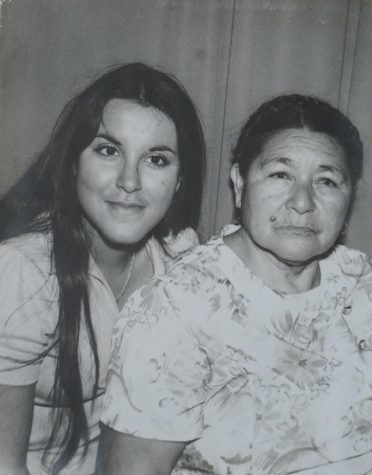
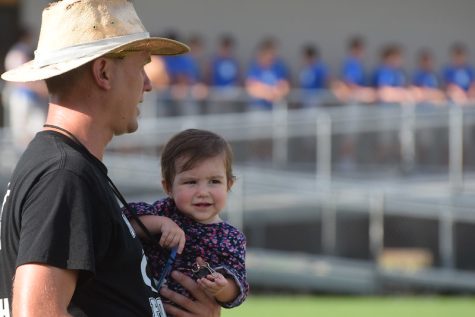

![DANCING QUEEN ONLY 15: The Mccallum quinceañera took place Saturday May 18 in the cafeteria. Students who danced at the quinceañera practiced for weeks during lunch and after school with the help of Señora A to perfect this special moment. “I signed up for fun and for the dress originally, but I actually made a lot of friends, and it helped me want to come back to practice,” said Elizabeth Peables, a freshman quinceñeara. “It’s been stressful, but it always works. We stayed very late yesterday [the day before the event], but today it feels like everything came together.”
Caption by Nellie Eschberger with reporting by Beatrix Lozach.
LA REINA DE BAILE, SOLAMENTE TIENE 15 AÑOS DE EDAD: La Quinceñera de McCallum fue el 18 de Mayo en la cafetería. Estudiantes que bailaron en la quinceañera practicaron por semanas durante el almuerzo y después de la escuela con la ayuda de la Sra. A para perfeccionar este momento especial.
“Originalmente me inscribí para divertirme, y por el vestido, pero actualmente hice muchos amigos y me ayudó a querer regresar a la práctica.” Dijo la estudiante de primer año Elizabeth Peables. “Ha sido muy estresante, pero siempre funciona.” “Nos quedamos muy tarde ayer el día antes del evento pero hoy se siente que todo está cayendo en forma.”
Leyenda por Nellie Eschberger con reportaje de Beatrix Lozach. Traducción por Maverick Palacios.](https://macshieldonline.com/wp-content/uploads/2024/06/53732328578_3ee2526f55_o_53769409497_o-600x338.jpg)

